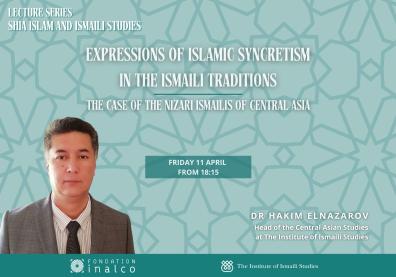Expressions of Islamic Syncretism in the Ismaili Traditions. The Case of the Nizari Ismailis of Central Asia

The Nizari Ismailis of Central Asia, residing in the Pamir and Hindu Kush mountain regions, have preserved unique cultural traditions which bear the imprint of the ancient civilisations and nations that inhabited the vast terrains of Central Asia in various periods of its history. Their religious practices are infused with multiple meanings embedded in their Islamic beliefs and influenced by their natural habitat. Explorations of their traditional practices and written heritage also point to the fusion of various pre-Islamic and Islamic practices, including Sufi traditions that reveal the syncretic nature of their beliefs and the richness of their Islamic heritage. The presentation will explore some of the salient traditions of the community, such as the funeral ceremony, known as Chirāgh-i Rawshan (the Luminous Lamp) and the devotional poetry — Maddo/Qaṣīda, highlighting the fusion of Sufi and Ismaili traditions and their role in the formation of the religious outlook and identity of the Ismaili community in the region.
Biographical note
Dr Hakim Elnazarov is Head of the Central Asian Studies at the Institute of Ismaili Studies (IIS), London. He holds a PhD in the History of Empires from King’s College, London. He obtained an M.Ed in Teacher Education from the Aga Khan University, Pakistan and a BA in Arabic language and literature from the Tajik State University. Hakim has edited several books and authored articles on various subjects, including religious education, endangered languages, gender issues and the history and intellectual traditions of the Central Asian Muslims. He is a Chief Editor of the IIS’s Russian and Tajik publications and is a Series Co-Editor of the Endangered Languages Yearbook, published by Brill in the UK.